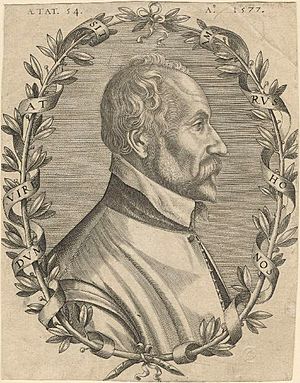Pontus de Tyard facts for kids
Pontus de Tyard (also spelled Thyard or Thiard) was a French poet and priest. He was born around 1521 and passed away on September 23, 1605. Pontus de Tyard was an important member of a famous group of writers called "La Pléiade".
Early Life and Poetry
Pontus de Tyard was born in Bissy-sur-Fley, a place in Burgundy, France. He was the seigneur (or lord) of this area, but we don't know the exact year he was born. He became good friends with other writers like Antoine Héroet and Maurice Scève.
His first book of poems was called Erreurs amoureuses, published in 1549. He kept adding more poems to it in later versions until 1573. His writing style was similar to what later became popular with poets like Pierre de Ronsard and Joachim du Bellay.
Pontus de Tyard was one of the first people to write sonnets in the French language. Sonnets are a type of poem with 14 lines. He is also known for bringing the sestina to French poetry. A sestina is a complex poem that came from a region called Provence.
Divine Inspiration in Poetry
Pontus de Tyard played a big part in the ideas of the La Pléiade group. He wrote about "divine fury" in his book Solitaire Premier, ou Prose des Muses, et de la fureur poétique (1552). This book explained a theory about how poets get their inspiration.
He believed that true inspiration came from a divine source, not from madness. He divided this divine inspiration into four types:
- Poetic inspiration, which was a gift from the Muses (goddesses of inspiration).
- Understanding religious mysteries, inspired by Bacchus (god of wine and revelry).
- Prophecy and seeing the future, inspired by Apollo (god of light and prophecy).
- Inspiration for love, brought by Venus (goddess of love).
Later Life and Public Service
In his later years, Pontus de Tyard spent his time studying mathematics and philosophy. He became a bishop of Chalon-sur-Saône in 1578. A bishop is a high-ranking religious leader.
In 1587, he published his Discours philosophiques, which were philosophical discussions. He was a strong supporter of King Henry III of France. He defended the king against the powerful House of Guise, a noble family that wanted more power.
Because he supported the king, Pontus de Tyard faced difficulties. He was forced to leave Chalon, and his home in Bissy-sur-Fley was attacked and robbed. Despite these challenges, he lived longer than all the other members of La Pléiade. He even saw new poets like François de Malherbe challenge the ideas of his group.
Pontus de Tyard gave up his role as bishop in 1594. He then retired to the Château de Bragny, where he passed away.
See also
 In Spanish: Pontus de Tyard para niños
In Spanish: Pontus de Tyard para niños
 | Toni Morrison |
 | Barack Obama |
 | Martin Luther King Jr. |
 | Ralph Bunche |


